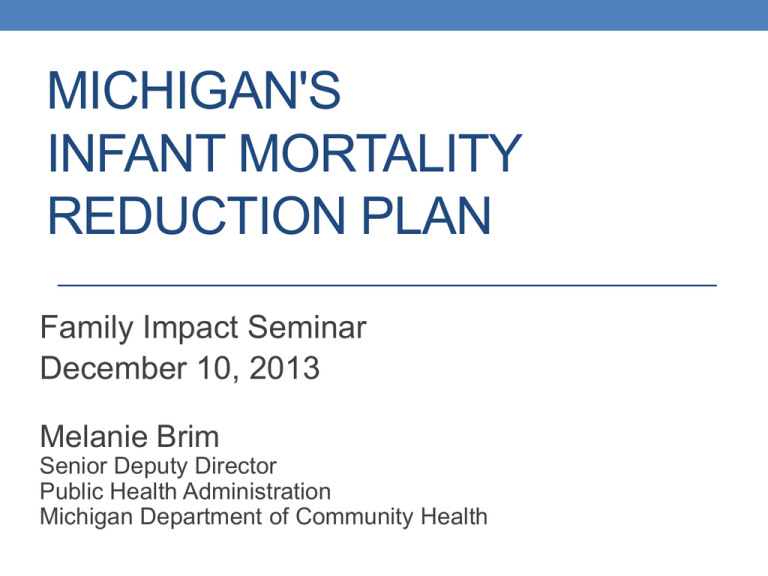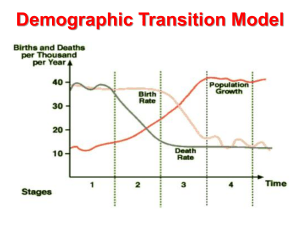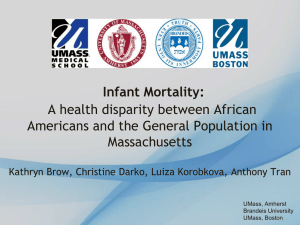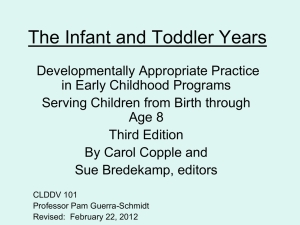An Overview of Michigan`s Infant Mortality Reduction & Prevention
advertisement

MICHIGAN'S INFANT MORTALITY REDUCTION PLAN Family Impact Seminar December 10, 2013 Melanie Brim Senior Deputy Director Public Health Administration Michigan Department of Community Health 1 2 Infant Mortality: Why it Matters… Infant mortality is a critical indicator of the overall health and welfare of Michiganders. http://www.michigan.gov/midashboard/0,4624,7-256-59026---,00.html 3 4 Infant Mortality: Why it Matters… • 817 Michigan babies died in 2010 • For every 1,000 babies born approximately 7 will not reach their first birthday 5 • Michigan ranks 38th among states for Infant Mortality Overall 2006-2008* • Michigan ranks 43rd for African American Infant Mortality, 2006-2008 • Caucasian IM Rate 5.5 infant deaths/1000 (2010) • African American IM Rate 14.2 infant deaths/1000 (2010) *Source: Kaiser State Health Facts http://statehealthfacts.org/comparemaptable.jsp?ind=47&cat=2 6 7 Infant Mortality Disparity 8 Infant Mortality Reduction • Long history of efforts to reduce infant mortality at national, state and local levels • Progress towards achieving the Healthy People 2020 infant mortality goals are unacceptably slow and even worse in populations of color • Infant mortality contributing causes are complex • To address causes we need to expand beyond medical care alone and include social determinants of health 9 10 Infant Mortality Reduction Plan is a component of Michigan’s Vision To create the environment for every Michigan citizen to be a healthy, productive individual, and to produce a child when desired, who is born at the right time, in the right place, and who in turn will become a healthy productive adult. 11 Infant Mortality Addressing infant mortality means attending to a full spectrum of factors that impact well being including the “social determinants of health” • Health- individual physical, oral and behavioral • Family • Social • Economic • Environmental 12 Root Cause for High Infant Mortality Rate • Culture • Access • Behavior • Methods • Policy • Preconception Health • Environment • Medical Considerations 13 Collaborative Approach Infant Mortality Reduction Plan 1. Implement a Regional Perinatal System 2. Promote adoption of policies to eliminate medically 3. 4. 5. 6. 7. 8. unnecessary deliveries before 39 weeks gestation Promote adoption of progesterone protocol for high risk women Promote safer infant sleeping practices to prevent suffocation Expand home-visiting programs to support vulnerable women and infant Support better health status of women and girls Reduce unintended pregnancies Weave the social determinants of health in all targeted strategies to promote reduction of racial and ethnic disparities in infant mortality 14 15 Strategy 1: Implement a Regional Perinatal System • Statewide coordinated perinatal system to assure that pregnant women and infants receive the right care, at the right time, at the right place and improve infant health outcomes and safety • Utilizes a regional model • Builds on the recommendations and guidelines developed by Michigan’s perinatal providers in Perinatal Regionalization: Implications for Michigan (2009) 16 Strategy 2: Eliminate medically unnecessary deliveries before 39 weeks gestation • Evidence shows that adoption of policies to eliminate medically unnecessary deliveries before 39 weeks of gestation will keep more babies alive– also called Hard Stop Policy • Reduces prematurity 17 Strategy 3: Promote adoption of progesterone protocol for high risk women • Screening can be done at the appropriate time to determine if the cervix is shortening – a risk factor that could lead to preterm birth • Evidence shows that adoption of a progesterone treatment protocol for high risk singleton women, those with short cervix, will prevent preterm birth 18 Strategy 4: Promote safe infant sleeping practices • Evidence shows that preventing accidental suffocation will keep more babies alive • Promote prevention and intervention that focus on safe sleep environments • Promote a clear message “prevent accidental suffocation” 19 Strategy 5: Expand Home Visiting Programs • Evidence shows that supportive home visiting services improve pregnancy outcomes and positively influence parenting practice • Promote expanded used of home visitation programs for at risk populations such as -Maternal Infant Health Program (MIHP) Medicaid population -Nurse Family Partnership program-1st time moms only Strategy 6: Support Better Health Status of Women & Girls Women have better pregnancy outcomes when they are healthy prior to and in between pregnancies Women who want to be pregnant have better pregnancy outcomes 60% of women of reproductive age are overweight or obese– promote obesity prevention using the 4 x 4 Plan 20 21 Strategy 7: Reduce Unintended Pregnancy • Teen Pregnancy Prevention • Title X Family Planning Program- free– sliding fee scale for those without coverage • Plan First! Medicaid family planning waiver 22 Strategy 8: Weave social determinants of health in all strategies to reduce racial and ethnic disparities in infant mortality • Implement Practices to Reduce Infant Mortality through • • • • • • Equity (PRIME) Dialogue with stakeholders on social determinants Educate public and local media Educate health care providers Advance societal perspectives of women Emphasize “place matters” Diversify the health care workforce









